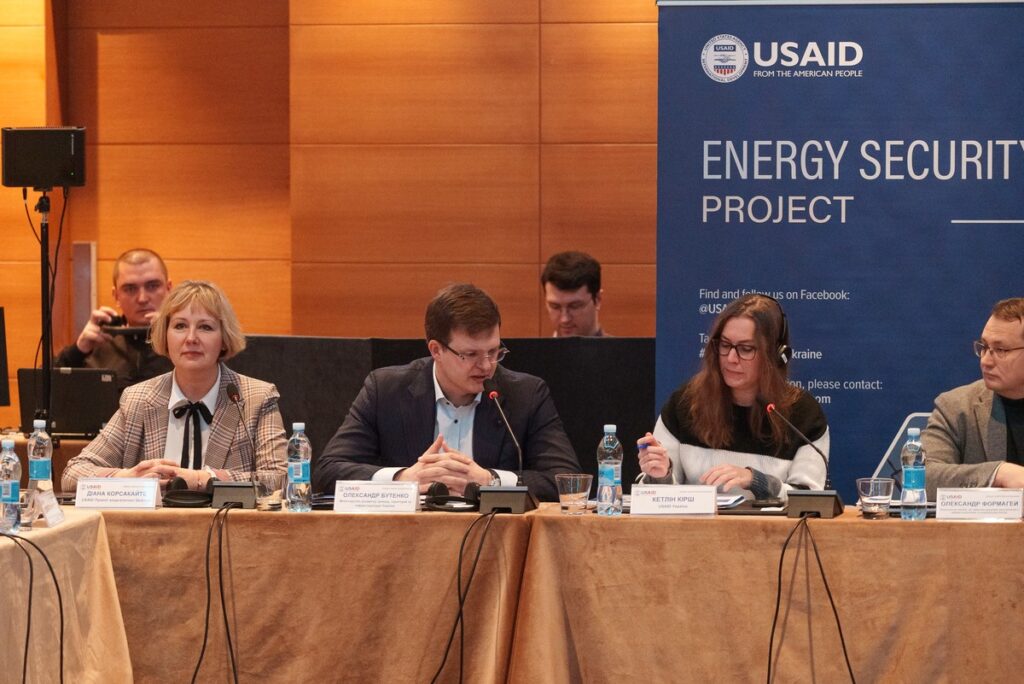On November 23, 2023, the USAID Energy Security Project (ESP), in collaboration with NEURC, held a joint seminar devoted to the possibilities of using cogeneration units to power critical infrastructure facilities in wartime. This training seminar aimed to familiarize small and medium-sized cogeneration operators (up to 20 MWe) with regulatory changes that enable cogeneration plants to power critical infrastructure during power outages.
Distributed cogeneration provides an uninterrupted power supply for the heating system’s needs therefore resulting in a continuous heat supply during power outages. In addition, distributed cogeneration may be a source of continuous energy supply for other critical infrastructure facilities at the local level, including water supply and sewage systems, hospitals, etc.

In her introductory remarks, Kathleen Kirsch, Energy Team Lead of the Office of Economic Growth, USAID/Ukraine, underlined that USAID ESP works in close partnership with the Government of Ukraine to secure local infrastructure and ensure reliable energy supply despite Russia’s attacks. “We know that the Government of Ukraine is working hard to proceed with the current heating season, which may be very difficult due to Russia’s possible shelling of the Ukrainian energy system. USAID ESP is contributing significantly to these preparations as well. We have been delivering critical equipment for the Ukrainian energy sector to strengthen the resiliency of electricity grids. We are providing assistance to the GTS Operator to increase gas system sustainability. We have also established a flow of technical assistance to heat supply entities to make their operation more efficient. In addition, ESP is a procurement agent to the Ukraine Energy Support Fund that focuses its efforts on restoring energy production, transportation, and distribution,” said Kathleen Kirsch.
Following Ms. Kirsch’s remarks, Oleksandr Formagei, Commissioner of the National Energy and Utilities Regulatory Commission, stated that USAID has made a considerable effort to unify Ukraine’s national authorities with the energy sector in their pursuit of constructing a durable and adaptable energy system.

Oleksandr Butenko, Deputy Minister of Communities, Territories and Infrastructure Development of Ukraine, highlighted the sustainability of cogeneration units during power outages and praised the collaborative work of the USAID ESP team in supporting their implementation. He also emphasized that the deregulation of cogeneration is the Ministry’s top priority this year. It represents a significant stride towards the ambitious aim of delivering over 90 cogeneration units during the heating season through USAID ESP.
Yuriy Ostapiuk, Head of the Investment Policy and Technical Development Division of the Department for Regulation of Energy Relations of the NEURC, updated the audience on the latest developments in the regulatory framework, such as the amendment to the Law on the Electricity Market, amendments to the Metering Code, DSO Code, Retail Electricity Market Rules, Licensing Rules, all of which are aimed at simplifying the commissioning of CHU installations, building technological lines and energy islands, thus increasing the resilience of cities. The discussion then focused on the opportunities for CHUs to participate in the electricity DAM and in the market of ancillary services, as well as on the peculiarities of public procurement and the economic rationale.
During the event, participants delved into the seminar topics and exchanged practical insights on utilizing small and medium-sized cogeneration units, along with the nuances of organizing energy islands. Oleksandr Dushenko, Director of CU Teplovyk in Starokostiantyniv, presented a project for direct power supply of the water pumping station and the hospital from a cogeneration unit, which will ensure their power supply in case of possible planned or emergency power outages from the integrated power grid. He also pointed out the CHUs’ capacity to fortify the heating system, increase its resilience, and yield notable cost-effective results.
To conclude the session, Yurii Kasich, the General Director of Vinnitsaoblenergo, explained the practical measures taken by the DSO to create energy islands in the region. “Energy islands are an effective solution for emergencies, especially during wartime. Well-planned energy islands can be scaled up in case of need,” stated Yurii Kasich. He underlined the importance of collaboration with DSOs on technical planning and implementation of energy islands, noting that the creation of multiple islands based on the DSO structure is the way forward for ensuring local resilience.
The seminar, which focused on some of the key aspects of USAID’s work in bolstering the Ukrainian energy sector, was attended by delegates from heat supply organizations, electricity suppliers, local government representatives, and central state executive authorities.
